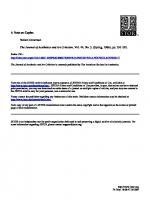
- Author / Uploaded
- Black Max
Introductory Note
Max Black The Philosophical Review, Vol. 57, No. 3. (May, 1948), pp. 207-208. Stable URL: http://links.jstor.org/sici?s
1,205 31 54KB
Pages 3 Page size 595 x 792 pts Year 2007
Recommend Papers
File loading please wait...
Citation preview
Introductory Note Max Black The Philosophical Review, Vol. 57, No. 3. (May, 1948), pp. 207-208. Stable URL: http://links.jstor.org/sici?sici=0031-8108%28194805%2957%3A3%3C207%3AIN%3E2.0.CO%3B2-K The Philosophical Review is currently published by Cornell University.
Your use of the JSTOR archive indicates your acceptance of JSTOR's Terms and Conditions of Use, available at http://www.jstor.org/about/terms.html. JSTOR's Terms and Conditions of Use provides, in part, that unless you have obtained prior permission, you may not download an entire issue of a journal or multiple copies of articles, and you may use content in the JSTOR archive only for your personal, non-commercial use. Please contact the publisher regarding any further use of this work. Publisher contact information may be obtained at http://www.jstor.org/journals/sageschool.html. Each copy of any part of a JSTOR transmission must contain the same copyright notice that appears on the screen or printed page of such transmission.
JSTOR is an independent not-for-profit organization dedicated to and preserving a digital archive of scholarly journals. For more information regarding JSTOR, please contact [email protected].
http://www.jstor.org Sun Jun 17 04:55:08 2007
A TRANSLATION OF FREGE'S UEBER SINN UND BEDEUTUNG Introductory Note
T
HE LOGICAL and mathematical writings of Gottlob Frege are gradually emerging from undeserved neglect. After a lapse of half a century, it is becoming generally recognized that his views on topics of fundamental importance in the foundations of mathematics and the philosophy of symbolism deserve very serious attention. And many feel that where Frege's judgment differs from the more generally received doctrine he is more likely to be right than his opponents. This process of revaluation would be hastened if Frege's writings were more generally accessible. I t has therefore seemed worthwhile to translate his famous paper on "Sinn und Bedeutung," published in 1892 in the Zeitschrift fur Philosophie und philosophische Kritik (vol. 100, pp. 25-50). The point of central interest is Frege's distinction between sense (Sinn) and designation or denotation or, as I have chosen to call it, reference (Bedeutung). This corresponds, in some measure, to a distinction which other philosophers have made between connotation and denotation, or intension and extension (or even description and acquaintance). But Frege's distinction is not to be identified with any of these. I doubt that many philosophers would accept Frege's demonstration that the referent of a declarative sentence is either the true or tlze false; or that many will sympathize with his dogged persistence in examining the relevance of his distinction to the manifold types of subordinate clauses which may be exemplified in complex sentences. But if his doctrines occasionally seem in~plausible,they always deserve detailed refutation; and the effort of following his argument is rewarded by flashes of penetrating insight. I n trying to prepare a literal translation which will not sound foreign, one runs into obvious difficulties. I n the present instance, these are aggravated by the novelty of Frege's ideas and the consequent lack of a settled terminology for their expression. (Thus some may object to my choice of "refer to" for bedeuten and "referent" for Bedeutung. But "denote" is misleading, "designatum" clumsy, and "nominatum" -Carnap's suggestion-too new for general acceptance.) The trans-
T H E PHILOSOPHICAL REVIEW
lator is also harassed by Frege's fondness for parenthetical qualifications and his liberal use of untranslatable German particles. I have tried to be faithful to Frege's intentions, even at the cost of occasional clumsiness. The following is a list of the chief terms used by Frege in technical senses (often diverging from common meanings of the words) together with the English equivalents chosen. Anschauung Art des Gegebenseins Bedeutung Begriff Begriffsausdruck Behauptungssatz Bezeichnung Bild Eigenname Erkenntniswerth Gedanke
Gedankentheil Gewohnliche Bedeutung Hauptsatz Nebensatz Sinn Satz Unbestimmt andeutender Bestandtheil Vorstellung JjTarheitswerth
Experience Mode of presentation Reference [for the process] Referent [for the object] Concept or predicate Predicate expression Declarative sentence Designation Representatioll Proper name Cognitive value Thought [a sense peculiar to F., for which Proposition has also been suggested] Part of a thought Customary reference Main clause Subordinate clause Sense Sentence or clause [according to context] Indefinite indicator [corresponds approximately to "variable" in modern usage] Conception Truth value
The footnotes are Frege's own, except for five interpolated comments, shown by the use of small capital letters as markers. Marginal numbers indicate the original pagination. Cornell Ulziversiiy MAX BLACK









